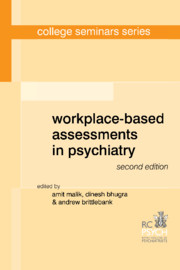Book contents
- Frontmatter
- Contents
- List of tables, boxes and figures
- List of contributors
- Preface
- 1 Introduction: changes in training
- 2 Workplace-based assessment methods: literature overview
- 3 Case-based discussion
- 4 The mini-Assessed Clinical Encounter (mini-ACE)
- 5 The Assessment of Clinical Expertise (ACE)
- 6 Multi-source feedback
- 7 Direct Observation of Non-Clinical Skills: a new tool to assess higher psychiatric trainees
- 8 Workplace-based assessments in psychotherapy
- 9 Educational supervisor's report
- 10 Portfolios
- 11 Annual Review of Competence Progression (ARCP)
- 12 Examinations in the era of competency training
- 13 Piloting workplace-based assessments in psychiatry
- 14 Developing and delivering an online assessment system: Assessments Online
- 15 A trainee perspective of workplace-based assessments
- 16 Conclusions
- Appendix 1 Assessment forms
- Appendix 2 Guide for ARCP panels in core psychiatry training
- Appendix 3 The MRCPsych examination
- Index
6 - Multi-source feedback
Published online by Cambridge University Press: 01 January 2018
- Frontmatter
- Contents
- List of tables, boxes and figures
- List of contributors
- Preface
- 1 Introduction: changes in training
- 2 Workplace-based assessment methods: literature overview
- 3 Case-based discussion
- 4 The mini-Assessed Clinical Encounter (mini-ACE)
- 5 The Assessment of Clinical Expertise (ACE)
- 6 Multi-source feedback
- 7 Direct Observation of Non-Clinical Skills: a new tool to assess higher psychiatric trainees
- 8 Workplace-based assessments in psychotherapy
- 9 Educational supervisor's report
- 10 Portfolios
- 11 Annual Review of Competence Progression (ARCP)
- 12 Examinations in the era of competency training
- 13 Piloting workplace-based assessments in psychiatry
- 14 Developing and delivering an online assessment system: Assessments Online
- 15 A trainee perspective of workplace-based assessments
- 16 Conclusions
- Appendix 1 Assessment forms
- Appendix 2 Guide for ARCP panels in core psychiatry training
- Appendix 3 The MRCPsych examination
- Index
Summary
Multi-source feedback (also known as peer ratings, 360°-feedback, MSF) involves collecting opinions about an individual from a range of co-workers using a structured rating scale. Psychiatry trainees work as part of a multiprofessional team with other people who have complementary skills. Trainees are expected to understand the range of roles and expertise of team members in order to communicate effectively to achieve high-quality service for patients. As such, obtaining feedback from members of the extended team provides a reliable, valid and hopefully educationally supportive method of assessing performance.
The technique was developed during the 20th century in settings external to medicine and has been used successfully in the military, education and industry (Powell & White, 1969; Woehr et al, 2005; Meeks et al, 2007). In the UK, there has been an explosion of MSF approaches proposed by medical and commercial organisations that have become increasingly focused following the publication of Good Doctors, Safer Patients (Donaldson, 2006). Additionally, the chief medical officer's White Paper, Trust, Assurance and Safety: The Regulation of Health Professionals (Department of Health, 2007) suggested that the role of multi-source feedback will become more and more significant for all doctors, not simply trainees, in the demonstration of fitness to practise and to support relicensure and revalidation.
The history of multi-source feedback
External to medicine
Multi-source feedback was first developed and evaluated in settings other than medicine. As early as the 1920s, psychologist Hermann H. Remmers led the field in education, discussing the importance of and considerations for students evaluating their teachers. After the Second World War the military explored the possible role of professional ratings in order to identify natural leaders (Williams & Leavitt, 1947). An increasing sophistication in the understanding of leadership led to increasingly refined models to assess it. Within industry, a desire to identify and facilitate good leadership became paramount as companies became increasingly competitive, especially in the 1980–1990s. Whereas psychologists tried to understand the dynamics of leadership, personality traits, behavioural styles and, more recently, complex models of leadership taken within the organisational situation, industry tried to find practical solutions to evaluating and motivating employees.
- Type
- Chapter
- Information
- Workplace-Based Assessments in Psychiatry , pp. 68 - 75Publisher: Royal College of PsychiatristsPrint publication year: 2011



